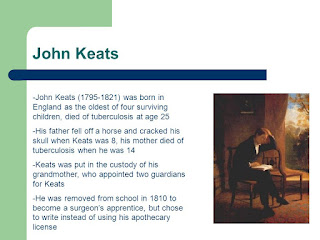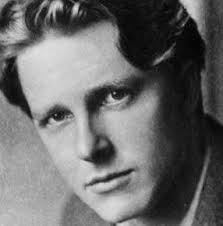ODE TO THE NIGHTINGALE
_JOHN KEATS
Ode to a nightingale is a personal poem that describes Keat’s journey
into the state of negative capability the tone of the poem rejects the
optimistic pursuit of pleasure found within Keat’s earlier poems and explores
the themes of nature and morality, the latter being particularly personal to Keats
the nightingale described within the poem experiences a type of death but does
not actually die. Instead, the song bird is capable of living through its song,
which is a fate that human cannot expect. The poem ends with an acceptance that
pleasure cannot last and death is inevitable pat of life. In the poem, Keats
regimens the loss of the physical world and sees himself dead as ‘sod’ or which
the nightingale sings.
The presence of weather is
noticeable in the poem, as spring came early in 1819 bringing nightingales all
over the death , ode to nightingale describes a series f conflict between
reality and the romantic ideal of uniting nature.
According to Richard Fogle “the
principal stress of the poem is a struggle between ideal and actual. Of course,
the nightingale’s song is the dominant image and dominant ‘voice within’ the ode.
The nightingale’s song within the poem is connected to the art of music in a
way that the urn in ‘ ode on Grecian urn’ is connected to the art of sculpture.
MYTH OF PHILOMELA
The Nightingale is
a symbol of beauty, immorality and freedom from the world’s trouble. Nightingale
is known for singling in the night time hence the name. In Greek and Roman myth,
the nightingale also alludes Philomela, whose tongue was cut out to prevent her
from telling about her rape, and who was later turned into a nightingale by the
Gods to help escape from death et the hands of her rapist.
THEME OF THE POEM” – “HAMLOCK”
·
Version of reality
·
Happiness
·
Morality
·
Transience man and the natural world
The speaker wishes he had a special wine
distilled directly from the earth. He wants to drink such a wine and fade away into
the forest with the nightingale. He wants to escape the worries and concerns of
the life, age, time etc. He uses poetry to join the nightingale’s night time world,
deep in the dark forest where hardly any moonlight can reach. He can’t see any
of the flowers or plants around him, but he can smell tem. He thinks it wouldn’t
be so bad to die et night in the forest, with no one around except the nightingale
flies away and leaves him alone. He feels disappointment that his imagination is
not strong enough to create its own reality. He is left confused and be wildered
not knowing the difference between reality and dreams.
“It would be rich experience to die, half
in love with easeful death”
John Keats





Comments
Post a Comment